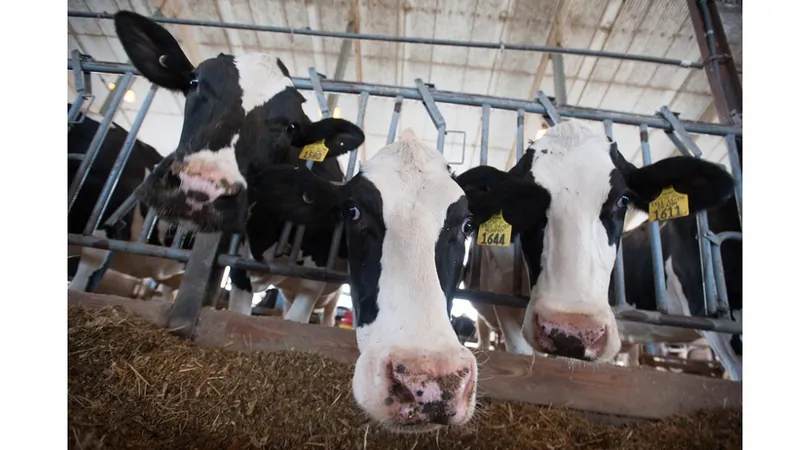
Breakthrough Sugar Treatment for Dairy Cows: A Game Changer Against Antibiotic Resistance!
2024-12-23
Author: John Tan
Breakthrough Sugar Treatment for Dairy Cows: A Game Changer Against Antibiotic Resistance!
A groundbreaking study from Penn State University reveals that a concentrated sugar solution could serve as an effective alternative to antibiotics in treating a prevalent infection in dairy cows. This innovative research, recently published in Frontiers in Veterinary Science, highlights a significant step forward in combating antibiotic resistance—a pressing concern in both veterinary and human medicine.
Introduction to Clinical Metritis
The study focuses on clinical metritis, a common uterine infection that often arises after calving, which poses serious health risks to dairy cows. "Antibiotics like ceftiofur are typically used to treat this condition, but they can contribute to the growing problem of antimicrobial resistance," explained Adrian Barragan, an associate research professor at Penn State and co-lead author of the study. "Our goal was to explore a non-antibiotic treatment that could maintain animal welfare while minimizing the risks associated with antibiotic overuse."
Significance for the Organic Dairy Industry
What makes this discovery particularly relevant is its significance for the organic dairy industry, where the use of antibiotics is heavily restricted. The use of a sugar-based treatment could not only benefit dairy cows but also inspire further research into similar applications for human ailments, particularly those related to uterine infections like endometritis.
Study Methodology
In an exploration led by Barragan and fellow researcher Erika Ganda, the team examined the efficacy of intrauterine dextrose—essentially a strong sugar solution—against the standard antibiotic treatment. Their approach leveraged the sugar's ability to draw moisture out of harmful bacteria, effectively dehydrating and killing them. While previous attempts to use this method in cattle produced mixed results, this latest study found that dextrose matched antibiotics in effectiveness for treating mild cases of metritis.
Study Results and Findings
Conducted on a dairy farm in central Pennsylvania, the study enrolled 77 cows diagnosed with clinical metritis, assigning them randomly to receive either the sugar treatment or systemic antibiotics. While the definitive sample size was smaller than ideal for clinching statistical significance, the study indicated that both treatments led to similar recovery outcomes. What’s more, the researchers discovered that dextrose did not disrupt the natural bacterial communities in the cows’ reproductive systems, unlike antibiotics, which can lead to long-term health issues caused by microbial imbalance. "Our findings are encouraging," Ganda noted. "They suggest that dextrose could provide a valuable, safer alternative for treating infections in dairy cows without the risk of breeding antibiotic-resistant bacteria."
Implications for Human Medicine
The impact of this research could extend beyond veterinary medicine. Barragan suggested that these findings may be applicable to human medicine, particularly for reproductive diseases. In light of medical literature advocating for sugar-based treatments, the potential for these methods to transition to human healthcare remains an exciting prospect.
Conclusion
As the discussion surrounding antibiotic resistance continues to escalate, innovations like this study illustrate the critical need for alternative therapeutic strategies. In the words of Barragan, "This could truly change the game for both animal and human health, drastically reducing our reliance on antibiotics." Stay tuned for further developments as this research unfolds, potentially reshaping the way we think about infection treatment in both agriculture and human health.


 Brasil (PT)
Brasil (PT)
 Canada (EN)
Canada (EN)
 Chile (ES)
Chile (ES)
 España (ES)
España (ES)
 France (FR)
France (FR)
 Hong Kong (EN)
Hong Kong (EN)
 Italia (IT)
Italia (IT)
 日本 (JA)
日本 (JA)
 Magyarország (HU)
Magyarország (HU)
 Norge (NO)
Norge (NO)
 Polska (PL)
Polska (PL)
 Schweiz (DE)
Schweiz (DE)
 Singapore (EN)
Singapore (EN)
 Sverige (SV)
Sverige (SV)
 Suomi (FI)
Suomi (FI)
 Türkiye (TR)
Türkiye (TR)